16 - 30 of 87 records
JM-292: Putting a premium on aggression and treaty breaking
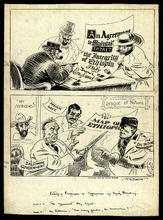
Description:
Editorial cartoon depicting Italy, France, and Britain pledging to help Ethiopia, then carve it up.
Member of:
McCutcheon Editorial Cartoons - ALL (Collection)
Resource Type:
Still Image
JM-W017: "I'll have to tighten your belt, Uncle"
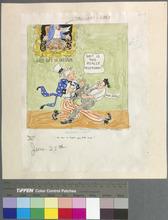
Description:
A figure labeled "New Deal" severely tightens Uncle Sam's belt, while Uncle Sam protests. A portrait of the "New Deal" on the wall behind the two figures has the label: "God's Gift to Britain."
Member of:
McCutcheon Editorial Cartoons - ALL (Collection)
Resource Type:
Still Image
JM-W024: In the Allied camp
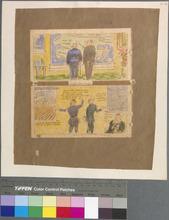
Description:
Editorial cartoon depicting Churchill and FDR looking at a map of Europe in the top panel. In the bottom panel, Hitler, Togo, and Mussolini worry about the plane production in the U.S. as the "unpredictable" factor compared to their U-boats.
Member of:
McCutcheon Editorial Cartoons - ALL (Collection)
Resource Type:
Still Image
JM-291: The changing world
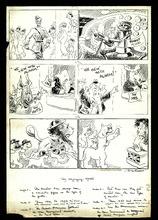
Description:
Editorial cartoon depicting three panel sets, with each panel containing a different cartoon. In the first panel, a robot replaces aviator; in the second panel, a donkey and elephant switch places between the "In" and the "Out" parties; in the third panel, the British lion cubs warn against war.
Member of:
McCutcheon Editorial Cartoons - ALL (Collection)
Resource Type:
Still Image
JM-076: Britain's Black Friday
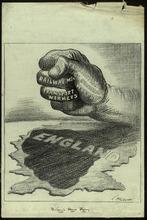
Description:
Editorial cartoon depicting a huge fist over England. The fist has words written on it: "Miners," "Railway men," "Transport workers," and "Federation of general workers."
Member of:
McCutcheon Editorial Cartoons - ALL (Collection)
Resource Type:
Still Image
JM-W001: Platform interests
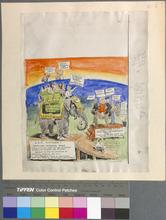
Description:
Editorial cartoon depicting the G.O.P. party platform. An elephant stands on the platform, supporting Republicans on its back; a man holds up a sign advertising American interests first. A donkey stands on the "Reds" platform, with just a couple of people supporting the New Deal and foreign sycophancy sitting on the donkey. A British and a Soviet figure stand on the horizon.
Member of:
McCutcheon Editorial Cartoons - ALL (Collection)
Resource Type:
Still Image
JM-312: The changing world
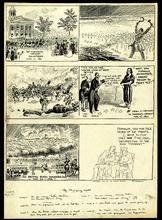
Description:
Editorial cartoon depicting three scenes of U.S. military and problems caused by foreign states.
Member of:
McCutcheon Editorial Cartoons - ALL (Collection)
Resource Type:
Still Image
JM-165: The great temperance worker
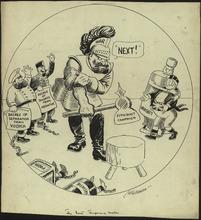
Description:
This cartoon shows personified World War I separating countries from their chains to alcohol. The man with the decree on separation is a representation of Russia, who legalized prohibition from 1914 until 1925. The man to his right, holding a separation for absinthe, is a personified France, which banned the manufacture and sale of absinthe in 1914. The man chained to whiskey seeking freedom is representative of Great Britain, who never ratified any serious form of a national alcohol ban. There are many theories as to why these countries (including the United States from 1920-1933) banned the sale or manufacture of alcohol in some way. The cartoon suggests these bans were caused by what many referred to as the "efficiency campaign," which was depicted as the axe used to separate alcohol from these countries. The efficiency campaign suggested these countries were more productive when its citizens (especially laborers) were sober. After banning the sale of alcohol in Russia, the government proudly announced Russia's increased labor output and better economic standing. The heightened need for resources, and diminished labor force from World War I is thought to have inspired the need for higher economic efficiency in European nations. (Summary created by Mary Delano, MU History Intern, Spring 2018)
Member of:
McCutcheon Editorial Cartoons - ALL (Collection)
Resource Type:
Still Image
JM-164: Will there be enough to go round?
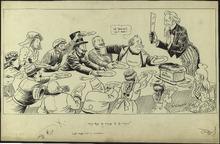
Description:
This cartoon depicts Uncle Sam trying to divide "U.S. Bread" among various nations. In 1915, World War I was being fought in Europe, but the United States was maintaining a neutral position. Despite its neutrality, the United States supplied resources and arms to nations during the war. All of the countries sitting at the table are nations who lobbied for resources from the United States during the war. England is attempting to block Germany's chance of receiving resources from Uncle Sam. This is representative the attempts of the British government to limit the United States aid to Allied Powers, most often England. The United States is also sitting at the table, looking worried about sharing the beard with other nations. The United States distributing more resources than it could afford was a fear for many Americans in the 1910s. (Summary created by Mary Delano, MU History Intern, Spring 2018)
Member of:
McCutcheon Editorial Cartoons - ALL (Collection)
Resource Type:
Still Image
JM-186: Three scenes about labor workers
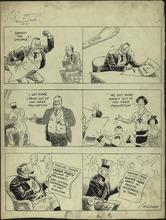
Description:
This cartoon depicts three different scenes in separate panels. In the top panel, a business man is angry about workers' unions and wants them to be "smashed," but later, with the threat of a strike hovering over him, he signs his name on a wage increase form. Negotiation between workers and employers were becoming a more common occurrence in the 1910s. Unions and the notion of collective bargaining were beginning to be protected under the law. In the middle panel, a man's boss is happy to get more labor out of the man since prohibition. The man's family also claims to get more money out of him since prohibition, and the children show off their new shoes. This panel shows the desired result of prohibition, which was to eliminate the loss of prosperity and productivity associated with drunkenness.In the bottom panel, John Bull smiles while reading the English paper, which proclaims the growing labor party might control government at next election. Meanwhile, Uncle Sam reads an American paper, which proclaims the Farmer Labor Party has grown to contain three people. As Uncle Sam reads the paper, there is panic in the background. The Farmer Labor Party was a political party founded in 1920 from the larger, international workers' movement associated with communism. As Uncle Sam reads the paper, there is obvious panic in the background. This last panel shows the significant difference in culture between the United States and England. England, like many other European states, was learning to tolerate the labor parties, and it eventually adopted the new parties into their political landscape. The United States was hypersensitive to any hint of communism, due to fears of a workers' revolution. Unlike England, the United States constantly sought to limit the influence and growth of these labor parties as much as possible. This fear is seen by the Red Scare the United States experienced in the 1920s. The Red Scare spread mass fear of communism, and it sought to eliminate communism completely from American economics and culture. (Summary created by Mary Delano, MU History Intern, Spring 2018)
Member of:
McCutcheon Editorial Cartoons - ALL (Collection)
Resource Type:
Still Image
A True list of the Lords Spiritual and Temporal: together with the members of the House of Commons, constituting the first Parliament of Great Britain, as they stand returned on the part of England in the Office of the clerk of the Crown in Chancery...
Description:
Original: 50 x 40 cm folded to 25 x 19 cm,Caption title.,Imprint from colophon.,"(Price 2. d.)"
Member of:
Resource Type:
Text
A Catalogue of prints in the Vetusta Monumenta
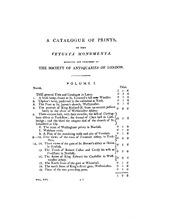
Description:
A catalogue of prints for volumes 1-4 of the Vetusta Monumenta.
Member of:
Vetusta Monumenta, Volumes 1-7 Double Page Images
Resource Type:
Text
Attempt to explain, define, and appretiate the liberty of the press, with a view to its importance, as connected with the rights and welfare of the people
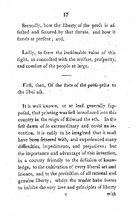
Description:
"Dedicated by permission to the Right Hon. Thomas Lord Erskine.",Advertisement at end.
Member of:
All Books and Texts
Resource Type:
Text
The Humble address of the House of Commons to the Queen
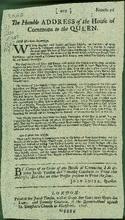
Description:
Concerns "the Account of the French King's persisting to Invade Your Dominions ..."Concerns "the Account of the French King's persisting to Invade Your Dominions ...",Caption title.,Leaf signed "Ggggg".
Member of:
Broadsides (Collection)
Resource Type:
Text
The Learned counsels answer to the Observator's letter,Observator's letter to his learned counsel
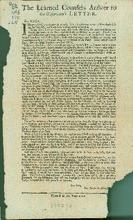
Description:
Broadside signed, "Dear Nobs, Your brother in adversity".,An answer to "The Observator's letter to his learned counsel", attributed to Richard Lechmere. Cf. Biblioteca Lindesiana. Catalogue of English broadsides 1505-1897. Item no. 1037.,Right lower part of page missing.
Member of:
Broadsides (Collection)
Resource Type:
Text
Pagination
- Previous page
- Page 2
- Next page